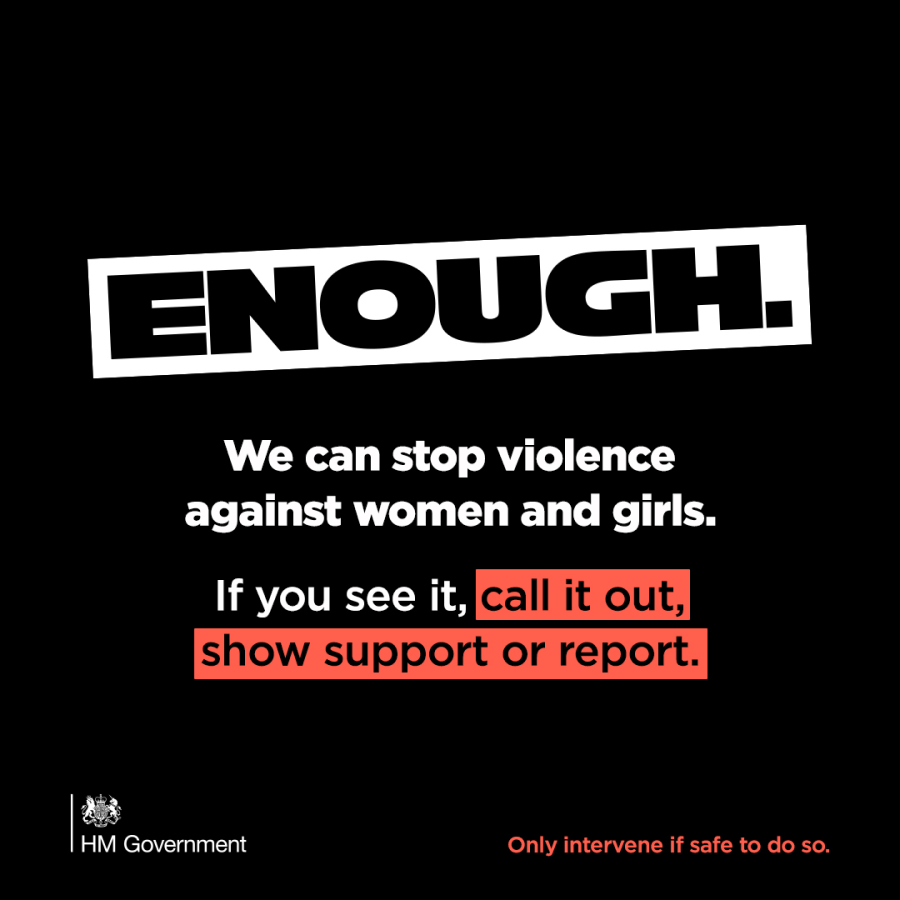What is the ENOUGH campaign?
Following an unprecedented response to the Violence Against Women and Girls (VAWG) Call for Evidence – which received 180,000 responses – the Prime Minister and Home Secretary commissioned the ENOUGH campaign to help tackle VAWG.
Initially launching in March 2022, the next phase of campaign activity focuses on the role of the bystander, and looks to empower them with practical tips and advice on how to spot and safely intervene when they see abuse against women and girls.
Just think STOP
Every day, huge numbers of women face violence, harassment, and abuse. It’s never acceptable and each of us has the power to tackle this abuse. By standing against all forms of abuse, we can create a society where women and girls are equal, respected and safe. Intervening doesn’t have to be dramatic or confrontational. Even small acts of recognition and support can help stop abuse. Here are four simple ways to help you step in safely - just think STOP:
| Say something. | You can show your disapproval at what is going on for example, by not laughing and saying, ‘I don’t think that’s funny’. Or you could be more direct, if you feel it’s safe to do so, by saying it’s unacceptable and tell them to stop. |
| Tell someone. | You could tell someone in charge, like the bar staff if you’re in a pub or club, Human Resources (HR) if you’re at work, or the train guard or bus driver if you’re on public transport. You could also tell another member of the public or a passer-by and see if they’re willing to help –working together can be a safer, more effective way to intervene. It is important to check in with the victim on who they want to tell, or if they want to call the police. |
| Offer support. | You can ask the victim if they’re OK. You could capture what’s happening on your phone and ask if they want the footage to report the incident, and you could offer to help report it. You could also help others already giving support. If it’s someone you know, check in with them at a time when they are alone and offer to help or support them to report if they want. If you think they might be in an abusive relationship, there is expert advice on what you can do and support available online or on the National Domestic Abuse Helpline. |
| Provide a diversion. | Sometimes what is best in the moment is creating a distraction to interrupt what’s happening and give the person being targeted a chance to move away or create an opportunity for others to get help by delaying what is happening. You could strike up conversation with the victim. You could ask for directions, or where the next stop is on the bus or pretend you know them. If you’re at work, you could make up an excuse to speak to them about an unrelated task. You could also try dropping something nearby or creating some other minor commotion. |
“Creating a community where everyone is equal, respected and safe is the responsibility of everybody in the community. The Women’s Network is really pleased to see the ongoing commitment from the University to tackle violence, harassment and abuse against women and girls. It’s never acceptable, it’s never ‘ok’ and it’s never ‘just a bit of fun’. Thinking STOP and finding a way to be an active bystander will contribute to making our community stronger and better for all.” - Katherine Leopold and Hester Burnige, Co Chairs, Women's Staff Network.
For more information on the campaign, click here. Additional support and resources can also be accessed here.
University support and resources
For information on Domestic violence and abuse support available from the university, please visit the following page which contains resources for staff and students.
We also recommend all staff and students to download the SafeZone app, which is our personal safety app for everyone at Greenwich. The app is free to download, and use, and is designed to put you in touch with the on campus first aiders, security or emergency response teams more quickly.
Report and support
Earlier this month, we launched Report and Support platform for students. Report and Support is the University’s new online platform where students can disclose how they have been affected by different forms of harassment including bullying, discrimination, hate incidents/crimes and sexual misconduct.
The service will be extended to staff and visitors next year. In the meantime, staff members can still help a student to complete the disclosure form.
If you have experienced any form of harassment and need support now, please check out our support pages; contact your People Partner; or visit Confidential Care: Your EAP.
Walk & Talks
The Walk and Talk scheme, offered by the Metropolitan Police, gives women working and living in London an opportunity to go for a walk with an officer in their local area and share their thoughts on safety and how to bring about positive change.
Those who take part in a Walk & Talk can share their views and experiences with officers as they walk through any areas they may feel vulnerable in. Patrols can take place at any time, including those where there is less footfall, traffic and light.
The aim of Walk & Talks is to start a conversation between members of the public and officers so we can listen and respond to concerns. For more information on the scheme and how to register, please click here.


